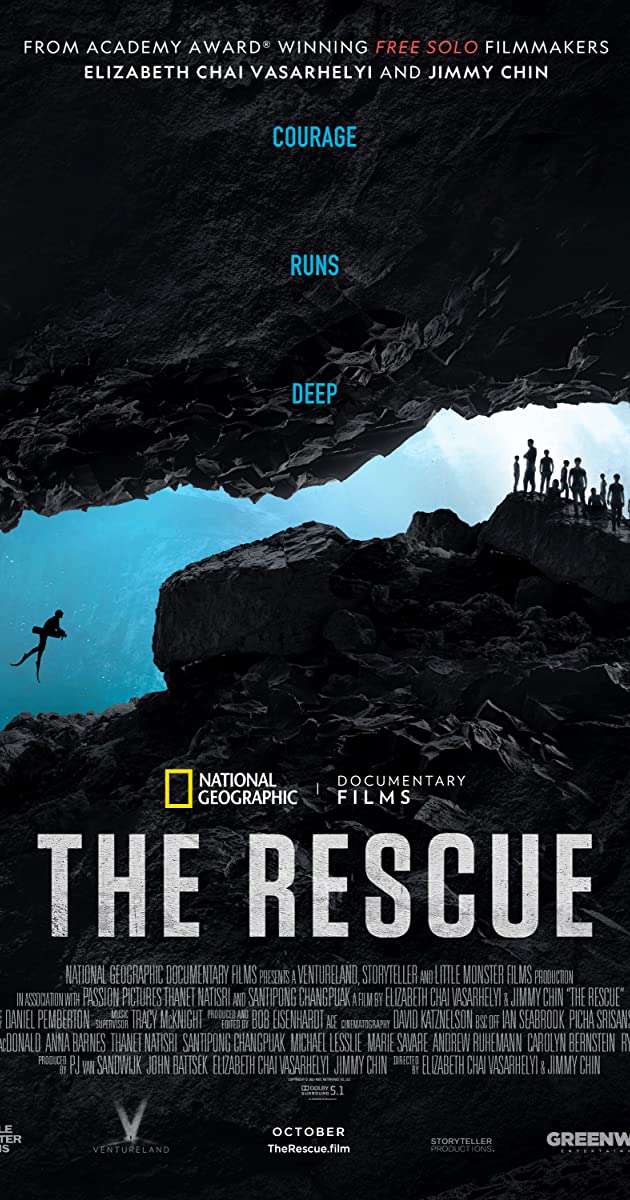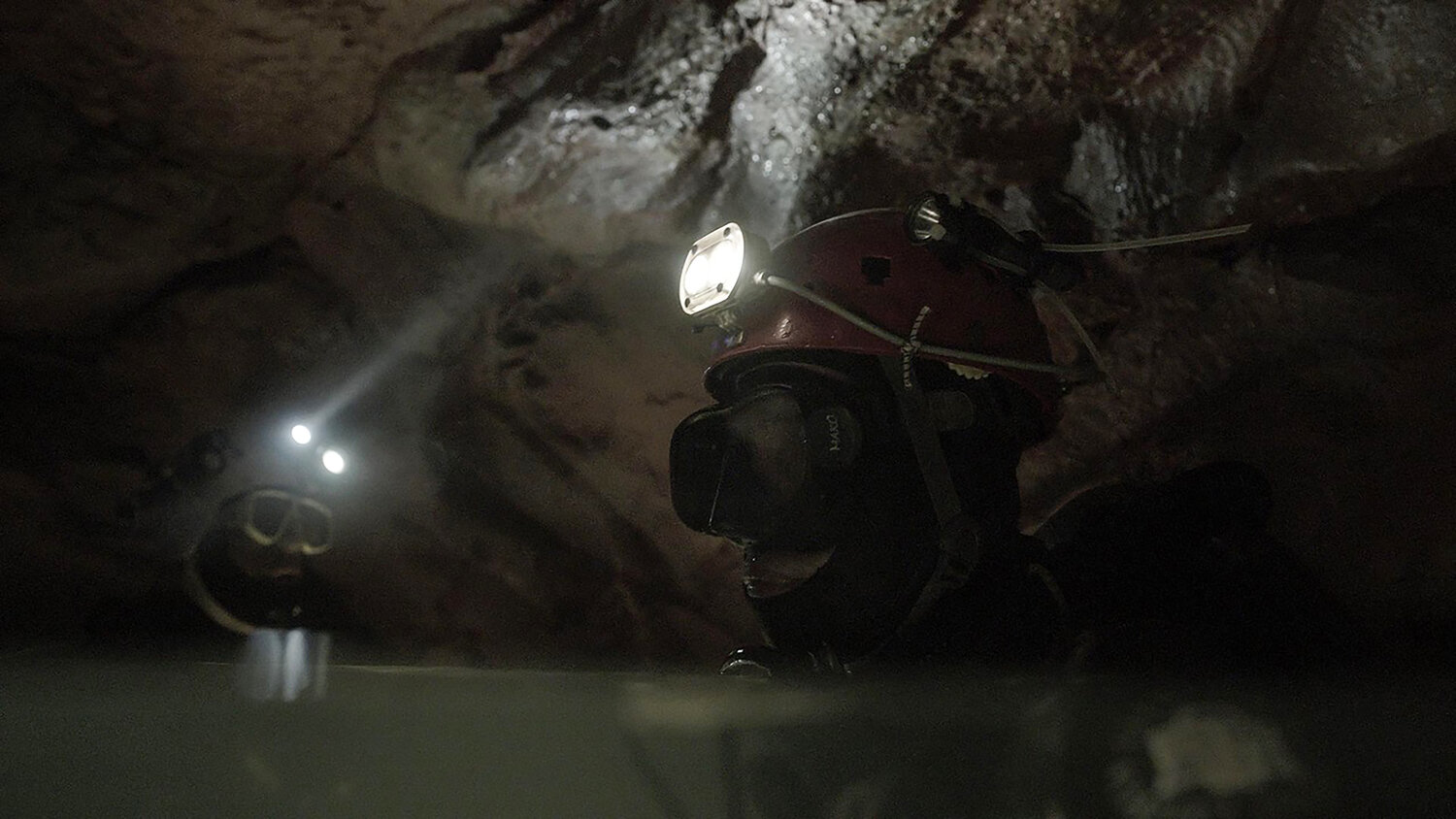Oscar award-winning directors Elizabeth Chai Vasarhelyi and Jimmy Chin return to bring you The Rescue, a documentary about the cave divers who took part in the Tham Luang cave rescue in Mae Sai, Thailand back in June 2018. The doc, which primarily follows the cave divers due to a rights debacle (more on that later), is ultimately the story of human achievement and overcoming impossible odds. This is obviously a subject Vasarhelyi and Chin are familiar with after delivering Free Solo, the Alex Honnold doc about free solo climbing El Capitan.
But, where Free Solo is perhaps more a story about human arrogance overcoming mother nature (I distinctly disliked the film because of the subject, not the direction), The Rescue is a story about people coming together from all walks of life in an inspiring and damn near-miraculous rescue of twelve children and one adult. So here are the basic parameters for those too lazy to do a deep dive into the history of the rescue (no puns intended):

On June 23rd, 2018, twelve members of a local junior soccer team, aged 11-16, and their assistant coach entered the Tham Luang Nang Non cave in northern Thailand in Mae Sai to celebrate the birthday of one of their members. An unexpected early monsoon season arrived early, flooding the cave system and trapping the team deep within one of the deepest cave systems in Thailand. After days of being trapped with rising water levels and failed search attempts, cave divers found the team about 4 kilometers (~2.5 miles) within the system. After overcoming a series of challenges, the boys and their coach were all rescued by July 10th, with the help of an international team of divers, rescue workers, military and government agencies, and volunteers.
The unfortunate part about The Rescue is that the doc only covers one portion of this story, granted the one that Vasarhelyi and Chin feel the most skilled at handling, but it cuts the story short at its knees at times, and it’s noticeable. Yes, the story is definitely about the rescue of thirteen Asian people, but is it an account that “does well by Asian protagonists,” as Vasarhelyi explained to Indiewire? No, it’s not. It’s a story about the primarily white, English cave divers who lead the cave rescue. There’s nothing really wrong with that, because undoubtedly Richard Stanton, John Volanthen, and the rest of the hundred cave divers are truly heroes in this doc.
But this is not a doc about Asians, this is a story about rescuing Asians, don’t get that mixed up. The one Thai rescuer we do spend some time getting to know is Saman Kunan, the one man who died during the rescue. But the reality is, even if Vasarhelyi and Chin wanted to cover the stories of the kids trapped in the cave, or their monastic coach who taught them how to meditate through their fear, pain, and hunger, or the petrified parents who could do nothing but stand, wait, and pray outside the mouth of the cave to the goddess of the mountain, they couldn’t have.
As vultures do, studios descended on the story of this cave rescue in order to turn it into either a documentary or a dramatic narrative film. Much in the way that The 33 was a dramatic film based on the 2010 mining disaster in the San José Mine in Chile, Netflix has acquired rights to the experiences of the soccer team, which means the filmmakers had their arms tied behind their backs. I have a lot of complicated thoughts about how I feel when Hollywood decides to kick the door down on tragedies in order to profit off of them with a star-studded, Oscar-baited movie, typically with a cast that is doesn’t accurately represent the actual people of the real-life event accurately. This is a whole other story, but the fact that Ron Howard has a dramatic film called Thirteen Lives starring Viggo Mortensen, Colin Farrell, and Joel Edgerton coming out in 2022 about this, makes me wonder how many of these stories will truly feature Asian protagonists versus Asian victims.
But, back to The Rescue. It is a feat of insane human resilience and ingenuity. Vasarhelyi and Chin seem to have a tendency to pick subjects with rather cold demeanors, but for these divers, their ability to seemingly cut emotion out while swimming through pitch-black caves works to their benefit rather than deficit. The filmmakers do a good job of bringing some depth to these subjects and suspense to the developing tale, even without the perspective of the children who are trapped. It feels very much like Vasarhelyi and Chin wanted to do their best to tell this Thai story, but the subject of the film is not really The Rescue. Or rather, it shouldn’t be. It should be about these cave divers, and they should have been more explicit about it.
Cave diving is an expensive and relatively obscure hobby. Few can afford the time and funds to do it, even fewer feel confident enough to dive into a cave where it’s pitch black and you feel more like you’re in outer space than on Earth. I wish that Vasarhelyi and Chin had explored more of the nuances of cave diving, much like they had with free soloing. There’s a touch of it when discussing the dangers of diving, but due to the sheer amount of information that must be delivered regarding the rescue, it falls to the wayside.
On top of that, why didn’t the filmmakers look into the potential impact of climate change on the monsoon season in Southeast Asia? I’m not saying that deeply scientific docs are Vasarhelyi and Chin’s wheelhouse, but given the fact that this is produced by National Geographic, surely a few moments discussing the implications of this disaster is useful? After all, the soccer players were locals who understood the caves and the monsoon season, they believed that the caves would be dry when they entered it.

Nor did they seem to really want to dig deep into the tensions that seemed to be arising between the Thai government and these foreigners being flown in from across the globe to rescue these kids. They danced around it a couple of times, with one of the divers saying that if the mission failed they would have to be spirited away from Thailand to avoid potential criminal charges. There seems to be a mountain of bureaucracy that these rescuers had to trudge through, along with cultural and language barriers, that feel ripe for the picking.
This may seem like a review littered with criticisms about The Rescue, but it’s an impressive doc, all things considered. Much of the footage was recreated to try and imitate the harrowing environment that these cave divers had to swim through, a feat that not even the Thai Navy SEALS could manage. Adding to the fact that they were filming during COVID and vaccinations allowed them to re-edit and add newly received footage from Thailand, this project was clearly important to the filmmakers. But, is The Rescue as Oscar-worthy as their previous projects? Hampered by the rights and filming complications, The Rescue is good, but it doesn’t do enough to reveal the whole story.
This film review is based on a screening from the Los Angeles Asian Pacific Film Festival. Photo Courtesy of Visual Communications.